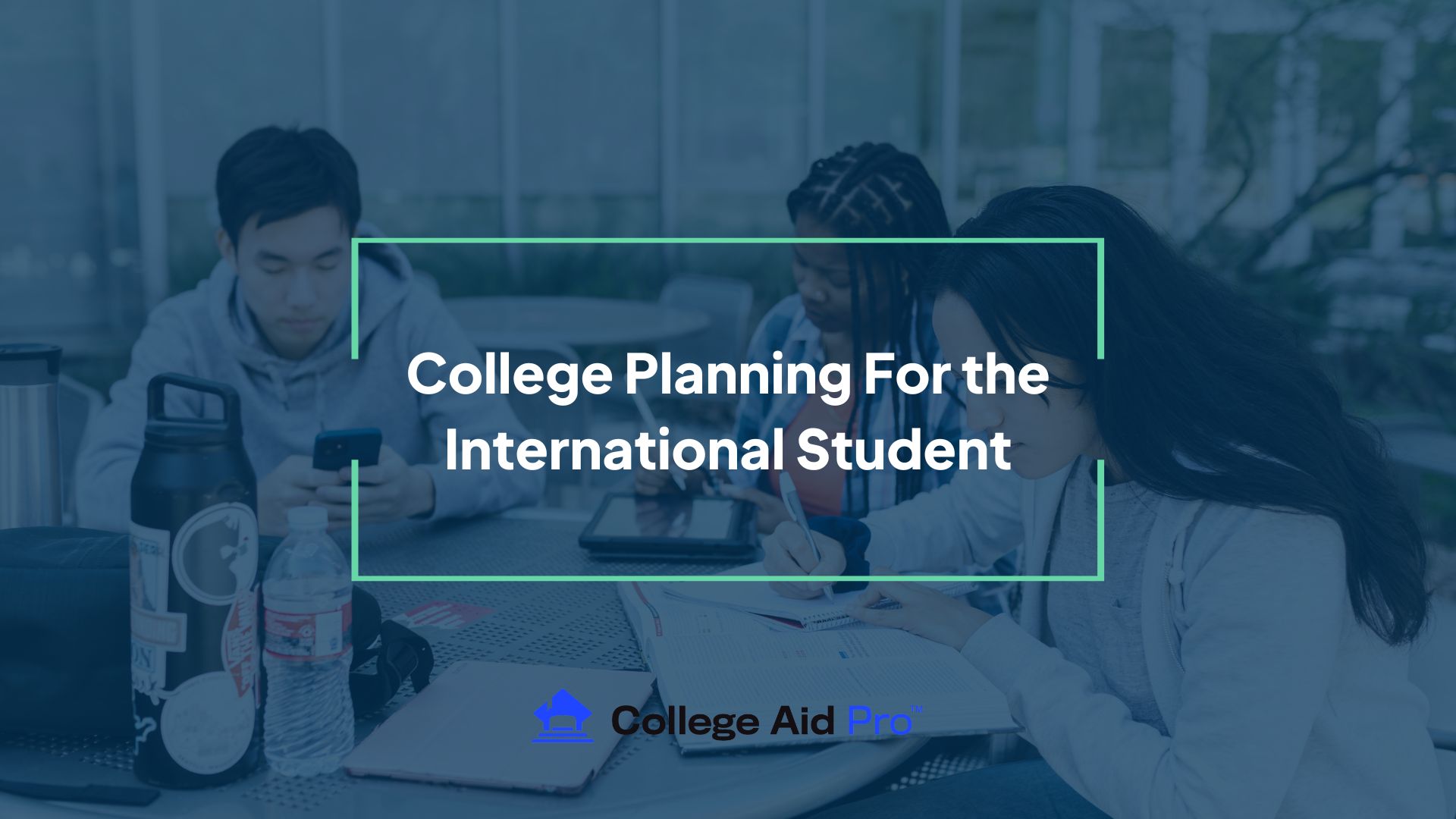Recently, I had the pleasure of speaking with Kristi Steele of KC360, who specializes in helping international students plan for attending college in the US.
Kristi began her college admissions career working as a recruiter for a private christian university. However, she left college recruiting because she became aware of a need to provide guidance to international students who wanted to come to college in the US. She ultimately earned her Masters in Digital Education, and began specializing in the admissions process for international students.
She recognizes that guidance for the financial side of planning for college is also a huge need, and while she has a good understanding of this area as well, she typically sends clients who are US citizens or permanent residents with more complex financial questions to myCAP for help.
For example, when it comes to questions of foreign tax, foreign income, foreign tax credits, and tax for expats living overseas – all things that become important when filling out financial aid forms – she prefers to send those to the financial aid experts at myCAP.
Kristi related to me one common example of a situation where myCAP advisors can be helpful. She is often hired by families working with humanitarian organizations overseas with salary packages that are structured in a way as to make their salary look inflated, causing the student to appear to have no financial need. This scenario takes special guidance – something that myCAP is able to provide.
Getting Scholarships
Kristi does a lot with the application side and finances for incoming international college students. Many students believe that if a school doesn’t have international scholarships they won’t be eligible to receive any aid, but that is not the case. A lot of schools have scholarships for these kids which they may hand out in a few ways.
- Need based aid – Some schools offer primarily need-based financial aid to students based on their financial aid forms such as the CSS profile or the school’s proprietary form.
- Even split – Other schools allot a specific amount of aid to be split evenly between all of their international students.
- Merit aid – Still other schools award aid based on academic merit or other student attributes.
Financial Verification
Students coming to school in the US from other countries, who are typically classified as foreign nationals, must obtain a Visa from the US State Department to do so. With every visa, students must go through a verification process, providing proof of assets or income showing that they can cover the cost of education minus scholarships, although some schools require proof not including scholarships.
Providing this information can be time consuming and a bit tricky in some cases. This could include bank statements, income statements from the parents’ workplaces, letters from family members offering financial support, etc. To complicate matters, most international families don’t have all their money in one place for security reasons like potential bank failures or major government shifts.
The student can send a copy of these bank records, but schools encourage them to have the bank send it directly. It needs to be translated into english and show USD values. Thankfully, banks are used to the process.
Verification and Affordability
The verification process is only meant to show that a student can pay for their education at a specific point in time, but because funds are typically coming from another country, they are subject to exchange rate fluctuations.
Suppose the economy in the home country has tanked and their currency has lost value against the dollar since the verification process was completed. That may mean that the cost of school is a lot higher than they originally planned.
Once a visa has been issued, they don’t have to re-certify even if the degree is now too expensive for them. The visa is good for the duration of time they are in school.
On the other hand, if the home economy gets better, the student may be able to qualify for a visa late in the process of accepting an offer to a school that they originally thought would have been out of financial reach. A student in that position may end up trying to scramble and apply for a visa at the last minute.
Also, a student may be admitted to a university but be turned down for a visa by the government. Therefore, lot’s of international students can benefit from guidance around the issue of obtaining a student visa.
Guidance for DACA students
Kristi says that private schools are sometimes a great option for DACA students because they don’t have the restrictions that some public schools have. DACA students don’t need a visa, and private schools don’t always need to verify citizenship.
Therefore, the student can be placed in the same admissions category as a US citizen, though they may still choose to be involved with the international office for support. There may also be more scholarship money available at these schools versus public universities because private schools typically have deeper endowments.
Getting the right information at the right time
Kristi believes in providing information to educate international clients at their own pace, providing monthly content on their timeline with important topics for what part of the process they are in and also covering things they need to know about American culture.
How Kristi helped one student coming from Asia
Kristi told me one of her favorite student stories. This particular young lady wasn’t sure what she wanted to do. While she was good at science, she was more gifted at illustration. However, she didn’t think she could make money as an illustrator because she wasn’t “that good.” She ended up majoring in biology and getting a minor in illustration and design.
To make the most of her education, and on Kristi’s guidance, she developed a relationship with professors to make the most of what her department had to offer. Professors are more than willing to help out students who show an interest in special projects, internships and other departmental opportunities.
The key is to be proactive in developing that professor/student relationship. The professors want to sell the program, but only to students who are interested and a good fit. This is important because internships and other opportunities can lead to employment after school.
This particular student found a place with a great support system for her, another really important feature for international students for many reasons. They probably won’t have a car, so help learning how to get around is essential. They may also need someone in the international office to show them how to pay bills, how to find a health clinic, and how to shop for groceries and other items.
With this strong support system and excellent academics, this student graduated and was able to find a job working for the publisher of a biology textbook that hired her to illustrate for them. Being able to mix and match her interests with her college major and minor, something that isn’t possible to do in all countries, made her a candidate for a career requiring both skills that she really enjoys.
What kind of support do international students need?
When schools provide the following types of support, students are more likely to succeed in college.
- Emotional Support – For example, the school may allow for students to receive a certain number of counseling sessions for free, and additional sessions for a small fee.
- Medical Support – Having a clinic on campus makes receiving basic health services much easier for students. The International Office may also be able to help them find off-campus medical resources.
- Orientation – Schools that offer international orientation provide that extra information that students coming from abroad need to better navigate the college and new surroundings.
- Ambassador Program – International students can be partnered up with another student, mentor or family from the community. There are so many little questions they may have that can be addressed through this relationship. It is also a good way to help them feel welcome.
- Academic Support – While academic services and support are usually open to all students, they can be particularly crucial to students coming from another country with different academic standards or norms.
- Practical Support – The international office can help students get set up with a bank account and drivers license or state issued ID, among other things, providing a huge benefit. Especially because international students may find the process for doing those things in the US to be very different and, sometimes, very confusing.
- Financial Support – If the student can find a job on campus, they can work up to 20 hours a week. Additionally, international students can intern anywhere, but they can’t be paid for any off-campus work or internship.
Kristi’s Top Three Tips
- Sit down and engage with professors to understand the program you are about to be in and to make the most of it once you are enrolled.
- Apply early because it gives you more time to get everything done, and make sure you don’t miss the big scholarship deadlines, which sometimes occur before the application has to be submitted.
- Take 30 minutes a day, 3 days a week, to make sure you apply for all possible scholarships.
For more information, Kristi has a wealth of information at kc360.co.
With careful planning and the right guidance, the US college application process can be conquered!



